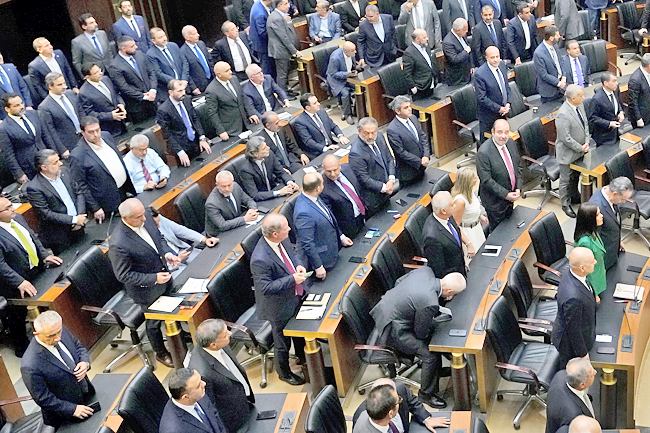BEIRUT (AFP) – Lebanese lawmakers on Wednesday failed for a 12th time to elect a new president, as bitter divisions between the Iran-backed Hezbollah and its opponents risk miring the country in a protracted power vacuum.
Crisis-hit Lebanon has already been without a head of state for more than seven months, and the previous attempt to elect a president was held on January 19.
The vote for the presidency, reserved for a Maronite Christian under Lebanon’s delicate sectarian power-sharing system, pitted the Hezbollah-backed Sleiman Frangieh against financial official Jihad Azour.
But neither had enough support to get the required two-thirds majority, with Azour garnering 59 votes and Frangieh 51.
All 128 lawmakers showed up for the election, but many left the chamber after placing their ballots in the box and quorum was lost before a second round of voting – where the winner only requires 65 ballots – was able to go ahead.

“Enough passing the buck… for prolonging the vacuum,” Parliament speaker Nabih Berri said in a statement after the session.
“Only consensus and dialogue” will speed up the election of a president, he added, without immediately scheduling a new ballot.
Analysts said the vote risked further entrenching a political stalemate, dimming hopes of saving the economy after more than three years of meltdown.
“At this stage, the most likely scenario is a prolonged vacuum,” analyst Karim Bitar said.
The United States and France had both pressed lawmakers to act.
State Department spokesman Matthew Miller voiced concern over lawmakers who left to deny a quorum, saying that Lebanese “urgently need a president who can enact reforms” to unlock International Monetary Fund support.
“For this to happen, Parliament must continue holding electoral sessions in the coming days and weeks to get that job done,” Miller said.
The international community has urged politicians to elect a consensus presidential candidate who can help the country enact reforms required to unlock billions of dollars in loans from abroad.
On top of lacking a president, Lebanon has been governed by a caretaker cabinet with limited powers for more than a year.



















































